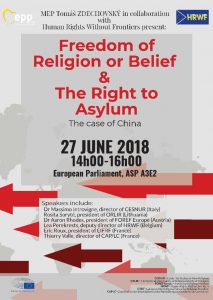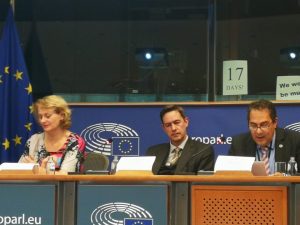 The Coordination of the Associations and the People for Freedom of Conscience is a european NGO with United Nation Consultative Status, created two decades ago and dedicated to protect the Right of Freedom of Religion and Belief.
The Coordination of the Associations and the People for Freedom of Conscience is a european NGO with United Nation Consultative Status, created two decades ago and dedicated to protect the Right of Freedom of Religion and Belief.
Developing our expertise since 20 years, defending religious minorities against discriminations in France and Europe, we produce reports on religious freedom issues and organize events, conferences and meetings to unite minority religions to fight discrimination in Europe and worldwide.
We are committed, with other NGOs and scholars organizations (CESNUR, HRWF, ORLIR, FOREF, EIFRF, etc…) to reveal and to raise in front of international bodies our concern regarding the persecution of CAG members in China and the denial of their asylum right in Europe.
Our Consultative Status at the United Nations gives us tools to alert Member States of the UN on the human rights violations endured by CAG members.
The 3 main UN bodies we can use to expose Human Rights violations are :
- the United Nations Refugee Agency,
- the Human Rights Council, and
- the Universal Periodic Review.
UNHCR
The UN Refugee Agency also called United Nations High Commissionner for Refugees (UNHCR) is mandated to lead a coordinate international action to protect refugees and resolve refugee problems worldwide. Its primary purpose is to safeguard the rights and well-being of refugees. It strives to ensure that everyone can exercise the right to seek asylum and find safe refuge in another state.
A report showing the consequences of the denial of the asylum right in some European countries for CAG members and relating the problems encountererd by the CAG to be accepted as religious refugees in Europe was submitted to the High Commissioner for Refugees a few months ago.
UNHRC
 The second United Nations body we work with is the United Nation Human Rights Council (UNHRC) whose mission is to promote and protect human rights around the world. The UNHCR has 47 elected members.
The second United Nations body we work with is the United Nation Human Rights Council (UNHRC) whose mission is to promote and protect human rights around the world. The UNHCR has 47 elected members.
The UNHRC investigates allegations of breaches of human rights in UN member states and adresses important thematic human rights issues such as freedom of assembly, freedom of expression, women rights and freedom of religion and belief.
An important point to know is that the General Assembly electing the Members States of the HRC can suspend the rights and privileges of any Council member that it decides has persistently commited gross and systematic violations of human rights during its term of membership.
This point is important because the constant pressure on the Chinese governement by exposing their violations of religious freedom could lead to their exclusion of the Human Rights Council and they really do not appreciate that.
Then, in March 2018 during the 37th session of the HRC, we organized a side-event with HRWF, CESNUR, ORLIR and EIFRF on Religious Freedom in China and the case of the Church of Almighty God.
After the speeches of the panelists which highlighted the different aspects of the situation in China, the attendees got the opportunity to ask questions to the experts present.
This Q&A enable the establishment of the first fruits of a dialogue with the Chinese delegates who obtained accurate answers from the panelists.
We continued to put pressure by doing oral statements at 2 sessions of the Human Rights Council.
An oral statement is a 2 minutes speech in front of the President of the HRC and all the Member States.
The Chinese delegate overreacted when he used his right to reply, proclaiming that religious freedom is respected in China.
The second oral statement has been delivered last Monday and we will know next week if there is a change of the position of China towards the CAG.
At the 37th session a written statement on the CAG persecution in China was submitted and at the 38th session, the current one, a written statement on Arbitrary Detention of the CAG members was submitted.
The written statements are recorded in the UN documentation and can be used as official documents.
Those actions, for the first time, have attracted the attention of the HRC and the Member States on the CAG situation in China.
UPR
The third UN body is the Universal Periodic Review, UPR.
The UPR is a mechanism of the United Nations Human Rights Council. It periodically examines the human rights performance of all 193 UN members states.
Some of the objectives of the UPR are :
- the improvement of the Human Rights situation on the ground
- the fullfilment of the State’s human rights obligations and commitments and assessement of positive developments and challenges faced by the State.
3 Members States, also called the Troïka, are selected for each state to be reviewed at UPR session (every 5 years). This Troïka facilitates the review, selected by the drawing of lots among the 47 members of the Human Rights Council.
The review of China is planned in November 2018.
The States of the Troïka of China are Hungary, Saudi Arabia and Kenya.
12 NGO were involved in the production of the 5 following submissions :
- Protection of civil and political rights in China
- Religious Freedom and Persecution in China, the case of the Church of Almighty God
- Religious Freedom in China
- Religious Persecution in China
- Religious Freedom in China : a cause of concern
Each member of the Troïka got a special briefing with the purpose to mention in their recommandations to China at the UPR the Human Rights violations made on the CAG.
Actions to expose the China’s violations of Human Rights will be continued by: oral and written statements during the next session of the HRC in September and by a side-event just before the Universal Periodic Review of China in November.
During this process of raising awareness of the UN bodies, we established a relationship with the UN Special Rapporteur on Freedom of Religion or Belief, Mr Ahmed Shaeed, who is very concerned by the religious Freedom in China and asked us to send him a debrief of the event of today.
All those actions have permitted to explain the CAG situation in China to the highest international bodies in the United Nations.
The joint efforts engaged by NGOs and scholars involved could allow the CAG members to safely and freely practice their religion in their own country.


